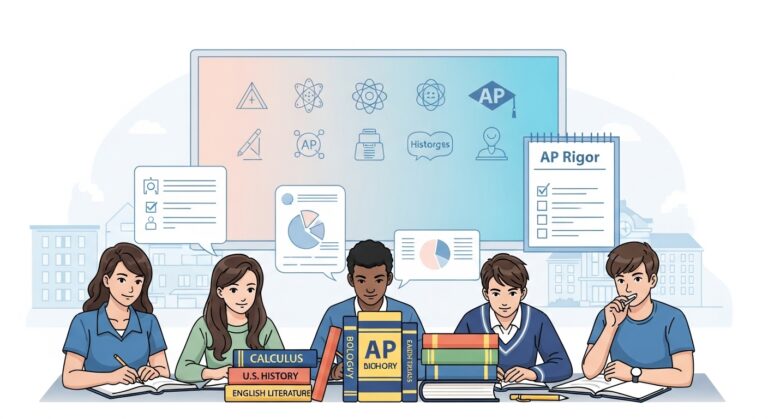A Complete AP Exam Guide for High School Students
The following information is designed for parents of students currently attending high school in the United States, offering an in-depth look at the AP (Advanced Placement) exam and practical advice on how to prepare. Drawing on nearly 20 years of experience in AP Test preparation, this guide will clarify the real value of the AP program and provide detailed tips for effective study strategies.
1. What Is AP (Advanced Placement)?
AP (Advanced Placement) is a program and series of exams run by the College Board, the same nonprofit organization responsible for tests such as the PSAT and SAT. It’s structured so that high school students can experience college-level coursework in advance, with annual exams (mostly in early May) for each subject.
- Administered by: College Board
- Number of AP Subjects: Approximately 40 different courses (Literature, Math, Science, History, Foreign Languages, Arts, etc.)
- Exam Timing: Every year in early May (split over two weeks by subject)
- Test Site: The student’s own high school or an approved exam center
If your child takes an AP course and scores 3 or higher (on a scale of 1–5) on the corresponding AP exam, some colleges will grant credit for that subject or allow your child to skip introductory courses.
2. Benefits and Value of the AP Exam
2.1 Boosting College Admission Competitiveness
During the college admissions process in the U.S., universities pay special attention to “the rigor and depth of coursework a student has undertaken in high school.” Taking more challenging AP classes and earning strong grades (and high scores on AP exams) demonstrates academic capability. In particular, for students applying to Ivy League or other top-tier universities, successful completion of AP classes and exams can be a considerable advantage.
2.2 Earning College Credit and Graduating Early
If a student in high school scores at least a 3 on an AP exam, some colleges may grant credit toward graduation. For instance, if your child scores a 5 on AP Calculus BC, they might skip entry-level calculus in college and enroll in a higher-level math course. This can reduce tuition costs and potentially accelerate graduation.
2.3 Fostering Academic Exploration and Career Insights
AP courses go beyond regular high school curriculum, offering an in-depth exploration of various fields. If your child is interested in a particular discipline (e.g., Biology, Chemistry, Economics, etc.), taking an AP course allows them to study at a deeper level. This experience can help them solidify their career interests and give them a taste of potential college majors.
3. Choosing and Preparing for AP Courses
3.1 Factors to Consider When Selecting AP Subjects
- Interests: Prioritize subjects that align with your child’s potential college major or career path.
- Availability at School: Not all high schools offer the same AP courses; if a course isn’t offered, your child may take it through online programs outside of school.
- Workload: AP classes can be demanding. Rather than overloading all at once, help your child pick courses that fit their overall academic schedule.
3.2 Timing and Planning for the Exams
Most students begin taking AP courses in 10th or 11th grade. However, individual ability and goals vary, so it’s beneficial to plan in 9th grade (or the start of 10th) which courses to take and when.
Possible Schedule Example:
- 10th Grade: AP World History, AP Biology (1–2 courses)
- 11th Grade: AP Calculus AB/BC, AP Physics, AP Language (3–4 courses)
- 12th Grade: 3–4 AP courses as well—often continuing or increasing the number to strengthen college applications
3.3 Study Resources
- College Board Official Website: Free outlines, past exam questions, and scoring guidelines.
- Review Books: Barron’s, Princeton Review, and similar well-known series.
- Online Courses: Platforms like Khan Academy or Coursera that offer AP-related lectures.
- Tutoring Centers / Private Academies: Personalized one-on-one or small-group instruction for efficient learning.
4. Exam Format and Scoring
4.1 Exam Structure
- A combination of Multiple-Choice and Free-Response Questions (FRQs).
- Free-response sections may include essays, short-answer questions, problem-solving in math and science, or lab reports, depending on the subject.
- Starting May 2025, 28 of the 40 AP subjects will fully transition to digital exams.
4.2 Scoring and Score Reporting
- Scores range from 1 to 5, with 5 being the highest.
- Scores become available online in mid-July, and students can request that their scores be sent to specific colleges.
- A 3 or higher is typically considered a “passing score,” but the exact criteria for credit or advanced placement varies by college.
5. Registration and Fees
5.1 Registration Period
- AP exam sign-up usually occurs in the fall semester (October–November) via the school or a testing center. Some schools have an additional registration/adjustment window in the spring (February–March).
5.2 Exam Costs
- Generally $95–$100 per exam in the U.S., with higher fees possible at international test centers.
- Some schools or local districts provide financial assistance—check with the school counselor for options.
6. How Parents Can Motivate Their Child
- Clarify the Advantages: Emphasize that passing AP exams can lead to college credit or advanced standing, which can save both time and money.
- Connect to Career Goals: Show how AP subjects in your child’s areas of interest can guide their future major and career decisions.
- Help with Time Management: AP courses cover extensive material, so effective scheduling is crucial.
- Set Small, Achievable Goals: Encourage regular practice tests or unit quizzes to track progress and maintain engagement.
7. Frequently Asked Questions (FAQ)
Q1. How is AP different from IB (International Baccalaureate)?
- IB is an integrated international curriculum with its own set of assessments, while AP is more flexible, letting students choose specific subjects to test in.
Q2. If my child scores a 5 on an AP exam, do all colleges award credit?
- Policies differ by institution. Many colleges grant credit or advanced placement for scores of 4 or 5, but verify each college’s standards in advance.
Q3. What if my child doesn’t get the score they hoped for?
- Performance can vary due to test-day factors like health, time management, or stress. If one or two AP scores are lower, strong performance in other areas can still compensate.
8. In Closing: Parents Play a Key Role
AP exams are not just “hard tests.” They can be pivotal in shaping your child’s future college experience and career path. As parents, ensuring strong motivation, sound planning, and emotional support can significantly help your child succeed.
- Collaborate with school counselors, subject teachers, and private academies to develop the best learning approach for your child.
- Tailor the choice of subjects and preparation strategies to match your child’s strengths and aspirations.
- The skills and knowledge gained through AP often become a solid foundation for academic and professional growth in college.
In essence, the AP exam stands out as one of the most credible and valuable academic assessments in U.S. high schools. When leveraged properly, it becomes a springboard for getting a head start in college.
Stay tuned for more in-depth insights on AP-related topics, study methods for each subject, and strategies for high scores. If you have any questions or would like to suggest a topic, feel free to leave a comment.
Thank you!
(Written by a 20-year veteran AP Test Prep Specialist)
Thank you,
Andy Lee / Elite Prep Suwanee
1291 Old Peachtree Rd, NW #127
Suwanee, GA 30024
Website: eliteprep.com/suwanee
Email: andy.lee@eliteprep.com
🔗 1:1 Educational Consulting (Online / In-Person): Sign Up Here


![[Announcement] Upcoming AP Capstone Webinars – Thursday, June 19 & Saturday, June 21](https://elite4usa.com/wp-content/uploads/2025/06/06172025-2-768x430.png)

